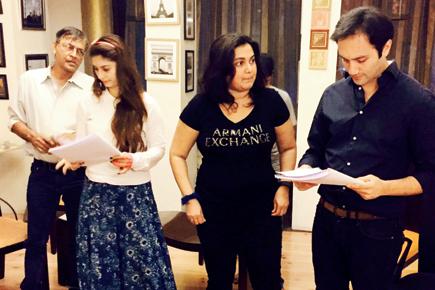A jury debates the guilt of a man accused of murdering his girlfriend, in a new play. And you, the audience, take the final call

Left to right: Michael Nazareth, Tanishaa Mukerji, Divya Palat, Aditya Hitkari rehearsing their lines
Jury trials in India were abolished after the infamous Nanavati case of 1959, where Mumbai-based naval commander shot his wife’s lover, and later surrendered to the cops. The jury found the accused innocent, although the Bombay High Court thought otherwise and dismissed the verdict. But, what if jury trials had continued in India?
ADVERTISEMENT

Left to right: Michael Nazareth, Tanishaa Mukerji, Divya Palat, Aditya Hitkari rehearsing their lines
It’s a concept Mumbai-based theatre director Divya Palat has explored in her upcoming play, The Jury. Nine men and three women — including an expectant mother — sign up for the exercise, the first of its kind in India. The overzealous lot doesn’t care about the case, and ulterior motives are soon revealed.
The end is not without its twists. Before the concluding act, 91 audience members seated in the first three rows are asked to vote ‘guilty’ or ‘innocent’, via a voting metre. They have 20 seconds. The final act is tweaked depending on the audience verdict. “I have written about 10 different endings for the play for which my cast members have rehearsed. So, even if you watch the show twice, you may have watched different endings,” says Palat, an exponent of interactive theatre. “In the play, the audience is the real jury and the actors, the mock jury,” she adds.
The idea struck the legal drama and thriller fan when crime thriller podcast Serial took the world by storm last year. “I wanted to explore whether legal systems in other countries, such as jury trials, are more effective. What if we put 12 Indians, who came from different cultural backgrounds, in a room and ask them to deliberate over a case? How would that work?”
The one-and-a-half-hour-long play, which took three months to write, picks up right after arguments in the case of the accused Aftab Khan, on trial for the murder of his girlfriend, are closed. The play is loosely based on the frequent cases of sexual assaults in the city, she says. “But unless you are not at the crime scene, you’ll never know the truth. Every story has a second side to it. Therefore, in jury trials, there is always a 50 per cent chance of getting wrongly convicted,” she adds.
And, whodunit? “I don’t know myself!” she laughs.
 Subscribe today by clicking the link and stay updated with the latest news!" Click here!
Subscribe today by clicking the link and stay updated with the latest news!" Click here!






